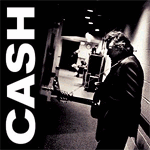 Johnny Cash
Johnny CashAmerican III
[American]
Rating: 8.6
We're constantly bombarded by noise. Especially for those of us who live in city, there's no escaping it; the noise of dense humanity has become a part of our lives. We accept and ignore it just to survive. But sometimes the noise becomes so overwhelming that the brain can no longer shut it out. That's when we do one of two things: lose ourselves, or lose our geography.
Earlier in the day on which I wrote this, I woke up to a busy hammer just ten inches from my head, flooding through the porous plaster wall. I swore at someone whose face I'd never seen. Then, the alarm clock joined in, providing a grating beat that lasted all day, accompanied at times by the horn blasts of sedate cabdrivers, the parade of victors and their drunk fans, and the deafening screech of the old red 6 train. The noise got so loud as to erase my memory of it having never existed.
Isn't it amazing, then, that I arrive home only to subject myself to more noise: music that to virgin ears would sound like a drowning robot or a greenhouse explosion? Yes, and understandable, too: the heightened stimulus threshold must be met. But just as silence makes clearer the urban noise I live through, so too does listening to Johnny Cash expose my mostly stentorian music collection.
Like 1994's American Recordings and 1996's Unchained, American III was produced by Rick Rubin and includes covers of well-known and lesser-known songs. On the opening number, for instance, Cash boils down Tom Petty's "I Won't Back Down" to its essence, employing just two guitars and a barely audible organ. The only important instrument here, though, is Cash's voice. As deep and heavy as a mudslide, it raises the dead, the lonely, and the heartbroken.
What makes this not just a covers album is that, as Cash explains in the record's liner notes, he makes the songs feel like his own. Sure, Petty wrote it, but its hard to deny that "You can stand me up at the gates of hell/ But I won't back down" is a quintessential Cash sentiment. They're not his words, but they are. Call it a vocal strongarm. And he does this again and again, from Neil Diamond's "Solitary Man" to Egbert Williams' "Nobody," from David Allen Coe's "Would You Lay With Me (In a Field of Stone)" to U2's "One."
But American III's high point is its two-song centerpiece. The first is Will Oldham's, "I See a Darkness," on which it becomes clear that, perhaps because of his neurological disorder, Cash's voice isn't as sure and strong as it once was. When he quavers, with Oldham singing backup, "Is there hope that somehow you can save me from this darkness?" the effect is absolutely devastating. You won't listen to the song the same after this. The shivers will eventually leave your spine, but the residue remains.
That song's transcendent power also stems from its production, which, although still sparse, is relatively lush. The organ and piano that rise to match the guitar remain in use for Nick Cave's "The Mercy Seat." Chronicling the first-person thoughts of a man being executed, this song, more than any other on the album, was written for Cash. Building to a rumbling crescendo, he belts out, "And the mercy seat is smokin'/ And I think my head is meltin'." This would've brought even Gary Gilmore to tears.
The second half of the album features mostly original compositions. Sparse like the early tracks, "Field of Diamonds," "Before My Time," "Country Trash," and "I'm Leavin' Now" prove that Cash hasn't lost his songwriting step, and they show why he can temporarily lay claim to other artist's songs. While some critics take issue with Rubin's underproduction, none of the songs on American III require ornate instrumentation. Whether they've been fluffed up or stripped raw, at the core of each is a compelling statement from one of our greatest humanists.
I keep telling people that I'm going to leave the city, and move westward to the country, or the mountains. I've done it before, and did so with enough success that I didn't concurrently sentimentalize the journey in an effort to reduce cognitive dissonance. It may be in two months or twelve, but sooner or later, I'll hit my breaking point, when I either lose the noise or it loses me. The survival instinct requires that I move.
Guess who's going to be guide.








